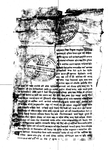An istihāra to the hill districts announcing the non-imposition of a separate levy on winter crops (VS 1988)
ID: L_0922_0008
Edited and
translated by Rajendra Shakya
in collaboration with
Rabi Acharya and Nadine Plachta
Created: 2018-08-20;
Last modified: 2023-01-24
For the metadata of the document, click here
The accompanying edition, translation/synopsis and/or commentary are available under the terms of the Creative Commons Attribution-ShareAlike 4.0 International License
Abstract
This istihāra attempts to encourage the hill districts to cultivate more winter crops by announcing the non-imposition of a separate levy on such crops, except for land where such a levy was already being imposed. It also prohibits the grazing of cattle on land cultivated for winter crops and makes arrangements for providing compensation for the loss of crops due to grazing.Diplomatic edition
[1r]
1इस्तिहार[Seal of Bhīma Śamśera][Seal of Juddha Śamśera][Unknown seal][Unknown seal][Unknown seal][Unknown seal][Unknown seal][Unknown seal][Unknown seal]1आगेपाहाडजिल्लाकातालुकदारजिम्मावाल2झुत्तावालथरीमुखियामिझारसुवाराईमोहिना
3गौरुंकटुवालकर्ताकारोबारीइत्यादिरसन्तम
4[?]भलाद्मीजानिफकारछोटाबडारैतिदुनिञा
5गैह्रकेयथोचितउप्रान्तपहाड्माअघिदेखिहिउँ
6देबालीकोतिरोलागेकोजग्गाबाहेकअरुजग्गामा
7हिउँदेबालीकोतिरोलाग्नेछैनहिउँदे
8बालिलाउनहुनेजग्गामाहिउदेबालिलगाई
9खानुभन्नेउर्दीदीसोबमोजिमगर्नलाउनु
10भन्नेसमेतजिल्लाजिल्लालाईपटकपटकसनद
11भैगएकोमापहाड़तर्फवर्षेबालिकाटेपछिचौपा
12याछाडागर्नेचलनभएकोलेकसैलेहिउँदेबालिलगाएकोपनीचौपायाछोडिख्वाईदिनेभै
13नोक्सानपर्नेहुँदाहिउँदेबालिकोउन्नतिहुननशकेकोव्यहोराकौशलमार्फत्जाहेरभएकोहुनाले
14सोहिउँदेबालिकोउन्नतिबढदैगैतिमीरैतिदुनिञालाईसुविस्ताहवस्भन्नानिमित्तयोइस्तिहार
15जारिगरिबक्सेकोछतसर्थअबउप्रान्तगाईभैंसीचौरीभेडाबाख्रासुँगुरगदाहाइत्यादिचौपा
16याहरुगोठालानलगाईछाडागर्नहुँदैनबाह्रैमहिनागोठालालगाईबालिनलगाएकाजमिनमामात्र
17चराउनेगर्नुसोबमोजिमनगरीलगाएकोबालिमाचौपायाछाडिअर्काकोबालिनोक्सानपारी
18दिबालिकाधनिलेतालुकदारसँगउजुरगर्नआएमाउसैउसैगाउँकातालुकदारभलाद्मीसमेत
19बसीनोक्सानिबालिकोबिगोधनीलाईभराईमिलाइदिनुतेस्तोचरिचराईगरेकोकुराबडाहा
20किमडौडाहागर्नजादावाअड्डैमावसेकाबखत्उजुरगर्नआयोभनेपनीनोक्सानिबालिकोविगोध
21निलाईदिलाईमिलाउनशकेसम्ममिलाईदिनुभन्नेगौंडागोस्वारालाईसनदभएकोहुनालेसो
22वमोजिम्गौंडागोस्वाराडौडाहागर्नगएकावखत्बाअड्डैमाबसेकाबखत्तेस्तोबालिकोनोक्सा
23निभैउजुरगर्नगएमागौंडागोस्वाराबाटआफ्नानाउँमाभएकासवालबमोजिमगरिमिलाईदिने
24छन्सोमिलाएकोमाबक्सौनिसरसलामिदैदस्तुरकेहितिर्नुपर्दैनसोबमोजिममिल्ननशकिनालेस
25गर्नआएमानालेसदर्तागर्ननपाउँदैअदालत्माखटिरहेकामेम्वरहरुलेसमझाईबुझाइमिल्नशकेसम्म
26मिलाइदिनेछन्सोमिलाएकोमापनीदैदस्तुरकेहीलाग्दैनगाउंकातालुकदाररबडाहाकिमअदा
27लतमाखटिएकामेम्बरहरुकाँहामिल्ननशकिअदालतमानालेसपर्नगयोभनेऐनबमोजिमअद
28लमिचेमासजायसमेतहुनेछसोजानीलेखिएवमोजिम्गर्नेगराउनेकामगरइतिसम्वत्
29१९८८सालभाद्रआसिंगते२१रोज६शुभम्_ _ _ _ _
Translation
[1r]
Āge: To all of the tālukadāras, jimmāvālas, jhuttāvālas1 , tharīs, mukhiyās, mijhāras, subbās, rāīs2 , mohīnāikes, gauruṅs,kaṭuvālas, kartās, kārobārīs, etc. and santas [and] heads of maṭhas, respected local persons (bhalādamī), the learned (jāniphakāra), lower- and upper-[class] (choṭā baḍā) ryots and [all] people of the hill districts
Yathocita uprānta In the hill [districts], no separate levy shall be imposed on winter crops on land other than land on which a levy has earlier been imposed on winter crops.
Sanadas were sent on various occasions to various districts [of the hill region], instructing [them] to have the following order carried out: "Cultivate and consume winter crops on land that is suitable for winter crops." It has since come to our notice through the kauśala that there has been a tradition of letting cattle graze after the monsoon crops are harvested in the hills, whence some leave their cattle on land seeded with winter crops and let them eat [those crops]. This has caused losses and hindered the spread of winter crops. We have thus issued this istihāra with the desire to spread [the production of] winter crops and make things [more] convenient for you ryots.
Therefore, from now on cows, buffaloes, yaks, sheep, goats, pigs, donkeys, etc. shall be attended by a herdsman and be allowed to graze only on uncultivated land throughout the year [lit. in all 12 months]. If they do not do accrodingly and cattle are left [to graze] on others' seeded crops, resulting in losses to crops, and if the owner of the crops comes to complain to the tālukadāra, then the tālukadāra and respected persons (bhalādamī)of the village in question shall sit together and settle the matter, compensating the crop owner with an amount equal to the loss in crops.
A sanada has been issued to gauḍās [and] gośvārās, stating: "If a baḍā hākima [comes across such cases] on an inspection tour (dauḍāhā) or if [someone] comes to complain about such grazing while he is in his office, settle the case by compensating the crop owner with an amount equal to the loss suffered; settle it as far as possible. Therefore gauḍās [and] gośvārās shall settle cases in accordance with the savāla issued to them if anyone goes to complain about such a loss of crops while [the head of] a gauḍās [or] gośvārā is on an inspection tour or in his office. No baksāunī or sarsalāmī need to be paid for the settlement (of the case).
If such a settlement cannot be reached and [the crop owner] comes to file a case [at court], the members assigned to the court shall try to convince [both parties] and settle the case as far as possible before the case is registered. No fees shall be charged for that settlement either. In the case where a settlement cannot be reached [through] the tālukadāra [or] baḍā hākima of the village or members assigned to the court, and a case is registered at court, punishment shall be assigned in accordance with the law (ain) if injustice has been done. Be informed of this and act in accordance with what is written [in the istihāra].
Friday, the 23rd of Aśvina3 in the [Vikrama] era year 1988 (1931 CE). Auspiciousness.
Commentary
This istihāra shows the state's concern over fertile land being left barren during the winter and its attempts to encourage the hill districts to cultivate more winter crops by announcing the non-imposition of a separate levy on land that produces winter crops, unless such land already is subject to one. It also prohibits the grazing of cattle on land used for winter crops and makes arrangements to provide compensation for the loss of crops due to cattle grazing.
The seal of Bhīma Śamśera, who was the prime minister when this istihāra was issued, appears at the top while, the seal of Commander-in-Chief Juddha Śamśera appears below it. This suggests that the istihāra was issued by Prime Minister Bhīma Śamśera.

